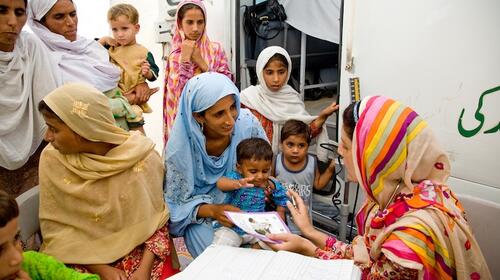Updates
Canada provides $21 million to boost access to family planning, reproductive health services in Pakistan
23 Dec 2019The Government of Canada has announced $21 million in new financing to support UNFPA's efforts to expand access to modern family planning and overall reproductive health services in Pakistan, where lack of access to such services is a major driver of maternal mortality, poor health and exclusion for women and girls.
The funds will bolster a gender-sensitive approach to delivering reproductive health services. The UNFPA-led project will be implemented by Healthy Pakistan Families in partnership with the Aga Khan Foundation Pakistan.
The project aims to help women and adolescent girls in Pakistan gain full control over their bodies and make their own decisions, which is central to their empowerment and to creating a more just, equal, and prosperous world. It also seeks to remove persistent social and cultural barriers that prevent Pakistani women and girls from accessing reproductive health services, including contraceptives.
“We know that when women and adolescent girls have access to a complete range of reproductive health services, they have better opportunities to be leaders in their communities and live healthy and productive lives," said Canadian Minister of International Development Karina Gould. "This investment will support thousands of women and adolescent girls in Pakistan and empower them to be all who they can be.”
"This project will give countless Pakistani women and girls the opportunity to develop to their full potential and contribute to the development of their communities," said Lina Mousa, UNFPA Representative in Pakistan.
Canada was UNFPA's second top donor in non-core contributions, eleventh in core contributions and fifth overall in 2014-2018. In 2018, Canadian assistance helped UNFPA avert around 7,500 maternal deaths; prevent an estimated 3 million unintended pregnancies, 907,000 unsafe abortions and more than 14,000 HIV infections; extend reproductive health services to close to 2.5 million adolescents; and protect almost 7 million couples from unwanted pregnancies.
In March 2017, Canada pledged $650 million over 3 years to address gaps in sexual and reproductive health and rights around the world. Canada is also a part of the Family Planning 2020 commitment, a global partnership to make contraceptives available to 120 million more women and adolescent girls by 2020.
